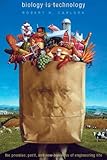Found in 2 comments on Hacker News
billswift · 2011-04-21
· Original
thread
This is a review of a book about biohackers by a journalist. If you want a better take on it read Rob Carlson's Biology Is Technology, http://www.amazon.com/Biology-Technology-Promise-Business-En..., and his website http://www.synthesis.cc/ , including for example, Garage Biology in Silicon Valley from a year ago, http://www.synthesis.cc/2010/03/garage-biology-in-silicon-va....


Agreed. Rob Carlson [1] argues in "Biology is Technology" [2] that regulation can't form an effective means to mitigate threats by limiting access to skills or materials, and that we should instead invest in the ability to develop rapid responses.
Further, he argues that the costs imposed by regulation on skill and material acquisition would weight most heavily on small firms, where most of the industry's innovation originates, thus slowing the very progress we need.
I highly recommend the book, as a review of recent (as of 2010ish) SB developments, comparison to other engineering disciplines, and for a treatment of how the regulatory/IP landscape could best support innovation in biotech.
[1] http://www.synthesis.cc/ [2] http://www.amazon.com/Biology-Is-Technology-Business-Enginee...